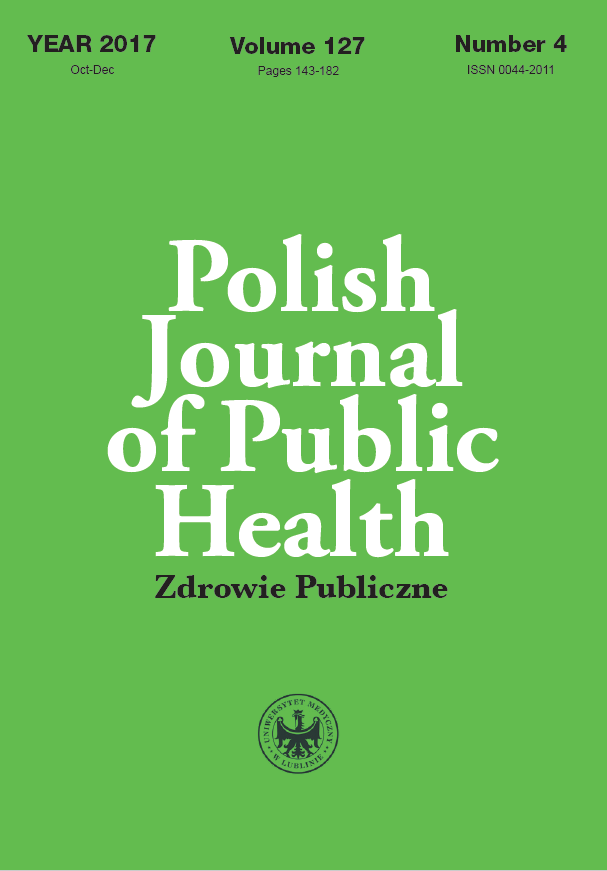Selected health behaviours of type 2 diabetes patients
DOI:
https://doi.org/10.1515/pjph-2017-0033Keywords:
health behaviours, type 2 diabetes, ageAbstract
Introduction. Type 2 diabetes is a chronic disease with an epidemic character. Its prevalence is associated with lifestyle, many environmental factors, and genetic determinants. Implementation of diet therapy is the basis for treatment of the disease.
Aim. The aim of the study was to assess health behaviours and differences in these behaviours in type 2 diabetes patients taking their age into consideration.
Material and methods. The questionnaire survey was carried out among 120 subjects diagnosed with type 2 diabetes. The original questionnaire comprised questions on selected pro-health behaviours, e.g. prophylactic behaviour or self-monitoring in the disease. The statistical analysis was performed on 111 properly completed surveys. The respondents were divided into three age groups: subjects under 60 (n=24), between 60 and 75 (n=64), and over 75 years old (n=23).
Results. Regardless of their age, the patients with type 2 diabetes indicated mainly arteriel hypertension as a coexisting complication. The basic element of patients’ self-monitoring was checking the blood pressure and glycaemia. Half of the patients declared body weight control, however, a majority were characterised by excessive body weight and abdominal fat deposits, irrespective of their age. Walking was the most popular form of physical activity chosen by the respondents. Regardless of their age, the type 2 diabetes patients exhibited similar readiness for self-education related to their disease.
Conclusions. The surveyed respondents exhibited similar behaviours undertaken to keep healthy. The increase in the regularity of doctor appointments and in the use of pharmacotherapy was closely related to age of the respondents. The advanced age of the respondents had an impact on the regularity of foot inspection. Respondents over 75 years of age adhered to recommendations on the schedule of food and medicine intake, but used diet therapy less frequently.
References
1. Mędrela-Kuder E, Bis H. Porównanie aktywności fizycznej i diety u kobiet i mężczyzn chorych na cukrzycę typu 2. Med Ogólna Nauki Zdr. 2014;20(1):31-3.
2. Araszkiewicz A, Piasecka D, Wierusz-Wysocka B. Ocena wiedzy pacjentów z typem 2 cukrzycy na temat przewlekłych powikłań choroby. Now Lek. 2012;81(2):158-63.
3. Świrska J, Fedurek D, Zwolak A. The knowledge of dietary rules among patients with diabetes. J Educ Health Sport. 2017;7(5):419-35. doi http://dx.doi.org/10.5281/zenodo.800717
4. Stupnicki R. Analiza i prezentacja danych ankietowych. Warszawa: Wyd. Akademia Wychowania Fizycznego; 2003.
5. Stanisz A. Przystępny kurs statystyki na przykładach z medycyny z wykorzystaniem programu Statistica. Kraków: Statsoft; 2006.
6. PTD, Zalecenia kliniczne dotyczące postępowania u chorych na cukrzycę 2017. Stanowisko Polskiego Towarzystwa Diabetologicznego. Diabetol Prakt. 2017;3(A):1-82.
7. Kalinowski P, Bojakowska U, Kowalska M.E. Ocena wiedzy pacjentów o powikłaniach cukrzycy. Med Ogólna Nauki Zdr. 2012;18(4):302-7.
8. Kurowska K, Nowakowska K. Poczucie koherencji a stan posiadanej wiedzy o chorobie u osób z rozpoznaniem cukrzycy typu 2. Diabetol Prakt. 2011;12(2):71-7.
9. Dudzińska M, Tarach JS, Malicka J, et al. Assessment of changes in self-control among patients with type 2 diabetes after the introduction of insulin therapy – a prospective study. Fam Med Primary Care Rev. 2013;15(3):315-7.
10. Włodarek D, Głąbska D. Zwyczaje żywieniowe osób chorych na cukrzycę typu 2. Diabetol Prakt. 2010;11(1):17-23.
11. Kurowska K, Frąckowiak M. Wsparcie społeczne a radzenie sobie w przewlekłej chorobie na przykładzie cukrzycy typu 2. Diabetol Prakt. 2010;11(3):101-7.
12. Szypnicka M, Sińska B. Ocena wpływu wiedzy pacjentów o żywieniu na skuteczność leczenia dietetycznego cukrzycy. Med Metab. 2013;17(3):35-40.
13. Zielke M, Reguła J. Sposób żywienia i aktywność fizyczna a wskaźniki antropometryczne chorych na cukrzycę typu 2. Żyw Człow Metab. 2007;34:1122-6.
Downloads
Published
Issue
Section
License
Copyright (c) 2018 Polish Journal of Public Health

This work is licensed under a Creative Commons Attribution-NonCommercial-NoDerivatives 3.0 Unported License.


